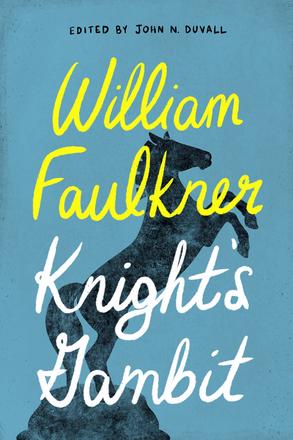
A new edition that corrects and restores six stories from the great Mississippi writer
Description
Originally published in 1949, William Faulkner’s Knight’s Gambit is a collection of six stories written in the 1930s and 1940s that focus on the criminal investigations of Yoknapatawpha’s long-time county attorney, Gavin Stevens—a man more interested in justice than the law. All previous and current editions of Knight’s Gambit have been based on the first edition, which is fraught with a number of problems. Since tear sheets of the five previously published stories were used in setting the first edition, the original Knight’s Gambit is a hodgepodge of various magazines’ house styles with no consistency in punctuation and spelling conventions from story to story.
Far greater issues arise, however, from the substantive (and sometimes substantial) changes magazine editors made to Faulkner’s prose. These changes were made variously for concision, propriety, or magazine design. Sometimes northern editors removed the southernness of Faulkner’s stories, either out of ignorance of the South or in order to appeal to a mass audience. Using four previously unknown Faulkner typescripts, along with other manuscript and typescript evidence, John N. Duvall presents an edition of Knight’s Gambit that restores over four thousand words that editors cut from the stories.
Also included is an introduction by Duvall discussing the role of detective fiction and popular magazines in creating a different kind of postwar readership for Faulkner that paves the way for the eventual republication of Faulkner’s modernist masterpieces. The new edition enables readers to reevaluate the stories of Knight’s Gambit and their place in Faulkner’s career as a short story writer.
Reviews
"Here are six masterly whodunits hot from the master's hand. And presented in prose possessing something of the fury of the people of these pages: a prose both violent and controlled; leashed and lunging. Only Gavin Stevens, a county attorney who considers justice to be composed of luck, injustice, and platitude in unequal parts, remains mild-mannered."
- The New York Times
"This new edition of Knight's Gambit continues to show the versatility of William Faulkner as a short story writer for a broader, crime-loving audience. But more importantly, especially to the Faulkner purists, this edition gives us not only the stories, but also the style, and the language, and all the words, that Faulkner originally intended. John N. Duvall has provided an important addition to the Faulkner canon."
- Michael Farris Smith, author of Nick and Blackwood
"In both his excellent introduction and in his meticulous restoration of Faulkner’s original manuscripts, John N. Duvall has rendered a great service not only for Faulkner scholars but also for Faulkner readers. The restored versions are richer in sound and sense, more Faulknerian, and convince me, as Duvall argues in his introduction, that Knight’s Gambit is a significant, and underestimated, achievement."
- Ron Rash, author of Serena and Something Rich and Strange
"John N. Duvall restores the text of Knight’s Gambit to Faulkner’s original intent and shines a revealing light on the practices of popular and pulp magazines and their editors."
- Robert W. Hamblin, coeditor of A William Faulkner Encyclopedia
"The texts of Faulkner’s stories have not before now received the same editorial attention as his novels; the same close, painstaking comparison of holograph, typescript, galleys and published versions that the late editor Noel Polk brought to his work for Library of America. But John N.Duvall has made an admirable start."
- Micheal Gorra, The TImes Literary Supplement
"Written for various monthly magazines through the 1930s and 1940s, these six stories are classic whodunnits set in the Deep South in the early 20th century. Edited by John Duvall based on the original manuscripts as penned by Faulkner, removing many of the stylistic and space considerations that were common to both pulp and highbrow magazines of the time, they can be read as the author intended."
- Scott Naugle, The Leader's Edge